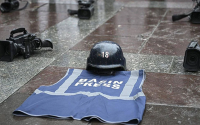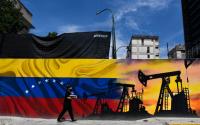Bin Laden needs tackling, but don't overestimate him
Expectations must be lowered: Afghanistan will never be Switzerland
The Guardian,Monday November 19, 2001There has been no sense of the ridiculous to the handful of days since John Simpson liberated Kabul. And yet so much is ridiculous. Not just us, quivering a week ago because an airliner had crashed on New York and Wall Street was plunging, then suddenly puffed with triumphalism and short-term memory loss as the Taliban scarpered. Osama bin Laden, too. He is, among other things, a ridiculous figure.
We are required, because of the havoc he has wrought, to dub him a mastermind, the supreme spider at the centre of an evil web. His disciples committed terrible acts. We saw them on CNN and wept. Here was a foe worth a "war" to defeat. The aircraft carriers and rhetoric cruisers set sail.
But consider this supposed genius now as he treks by donkey through the passes of southern Afghanistan, moving from cave to cave, eating fried eggs and kipping on ammunition boxes. What has he achieved?
The Taliban regime which harboured him and gave his organisation haven has disintegrated and hundreds of his al-Qaida foot soldiers from Saudi Arabia, Egypt and Pakistan are dead. Many more will surely perish around Konduz this week, Muslims slaughtered by Muslims. Could he have saved them? Of course. Does anyone seriously suppose that if the leader had stepped forward and surrendered himself on, say, September 21, taken up Mullah Omar's request for his "guest" to leave "voluntarily", that events would not have unfolded utterly differently?
A world coalition to catch somebody already caught? It doesn't seem likely. Nor did it, then, need genius to read the political runes. But neither self-sacrifice nor cunning were on the mountain menu.
What's happened since, moreover, has been a masterpiece of military ineptitude. Look at the Taliban army, carpet-bombed to collapse. Did they really suppose that forming conventional lines of defence in open country was smart tactics? Earl Haig would have paused over that. Examine the numerous safe houses left deserted in Kabul, with their mounds of "half-burned" top-secret documents, seemingly confirming the sum of all George Bush's nuclear and chemical fears. Did no one have the nous to see what was coming 30 minutes earlier - or had they run out of matches?
Either, pursuing Blofeldian conspiracy theories, you think that these charred dossiers and notebooks - these child's guides to making your own Nagasaki and China syndromes - are Machiavellian forgeries designed to scare western reporters and the CIA witless, or you take them for what they are: evidence of a shambles deserted in further shambles. Take, in prudence, that second explanation. I particularly like the Taliban foreign ministry papers where Mullah Omar shrugs off Pakistani warnings of bombings to come unless Osama bin Laden is handed over to the US or sent to a place where he can be picked up. Sorry, said Omar, I "want to get rid of Osama, but do not know how". Score one for the stupid party.
The point here is crucial, because it determines the tone of voice we adapt now and the way we react to coming events. It means seeing this "war against terrorism" whole.
There is no special glory in cluster-bombing to extinction a ragtag assemblage of soldiery too foolish to take to the hills; nor in putting to flight a leadership devoid of realpolitik. It had to be done, for want of better intelligence on the ground, but it is not exactly D-Day. The pursuit of al-Qaida henceforth will need that intelligence unless we prefer shelling the Edgware Road. Catching Bin Laden is part of this. Hunting down his lieutenants in Europe and America and the Middle East is part of it, too. Nothing is over and, perhaps, will ever be over. But let's not doubt the importance of the exercise.
Let's also, though, set it in a perspective the twin towers blew away. Osama bin Laden has just contrived the destruction of his greatest chums and allies. Al-Qaida, for all its manuals, millions and minions, has managed only three big strikes in its history, suicide killings of the low-tech variety. It needed to be stopped and still needs stopping - but it isn't Smersh. It lives and dies in a crass cocoon of plans abandoned and political imbecility, and we do ourselves no good when, because of our own failures of security, intelligence or resolve, we inflate its might. Our rhetoric needs puncturing as well.
The temptation in the coalition building was to blend the military with the diplomatic and the humanitarian in similarly inflated language. Thus the "broad-based, representative, multi-ethnic" government promised to Afghanistan by Jack Straw only four days ago. Thus his pledge "that we will not turn our backs on the Afghan people again... We have to bring the same energy to the coalition for building this new Afghanistan that we brought to the military coalition, and stick with the people in the long term".
Our foreign secretary, of course, is merely his master's voice (a little sir echo beside Colin Powell), but even so he lacks any sense of the ridiculous. While David Trimble scampers to shore up his broad-based coalition by turning Alliance tribes into Prodtoons for the day, Mr Straw claims some magical power. While the latest effort between good chums to sort out the pimple problem of Gibraltar stutters, he expects Tajiks, Hazaras and Uzbeks to live in harmony. While Cyprus, on the brink of European Union membership, remains divided, he offers to heal Kabul's wounds. While the UN sits impotent in Kashmir, he has a vision of Afghanistan as the Switzerland of Asia.
Brothers, it ain't going to happen. There may, for a while and with immense difficulty, be some kind of stitch-up. (Though it would be good to decide first whether the Taliban in the south have really melted away or just taken, belatedly, to the hills.) Aid flooding in will help. Cash always does. But it is simple vain glory to suppose that any of this will last. It never has. There will still be drugs and contraband (and oil) and warlords sitting on their bit of the action. There will still be outside meddling and raw brutality and battles to be fought; and a shrug of despair as Afghanistan falls off summit agendas. There is no magic age of democratic stability to be restored in Islamabad, let alone Kabul.
Those never very sure about this war have retreated before the cluster bombs to make some aftermath of progress its ultimate test. Set no such tests. The best we can hope for is that things may briefly get a little better. The bleak lesson of the past few days is that any impoverished state stupid enough to put its head above the terrorist parapet may get it blown off. And that, alas, it is ridiculous to hope for more.






